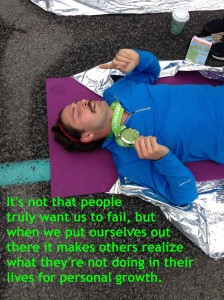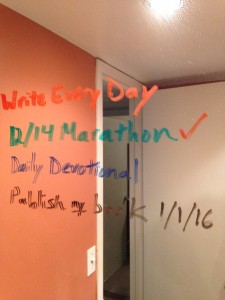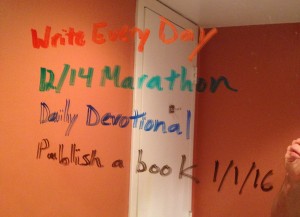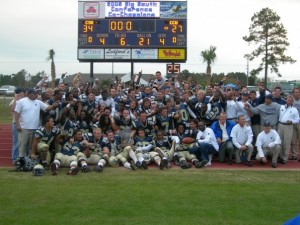Brief History
If you haven’t figured that out yet, I’m a big advocate of goals. I set them all the time, I achieve them as often as I can, and it brings me clarity to go through the process of setting goals. Just as in life, there is just as much we can take away from the journey to our goals as we can achieving the goal itself.
When making our goals, we have to go through a process instead of haphazardly putting things down for ourselves. If we do that, we might end up chasing vanity metrics in our businesses and waste time pursuing things we don’t actually care about in our personal lives. I hope today’s post in combination with yesterday’s post will give you some insight into how I set goals.
Nuts and Bolts
First, I reflected on a previous portion of my life/work and it just happened to be 2013 as a whole. New Year’s Resolutions are cliche for a reason, it works great to reflect and start a new year fresh after some rest with friends and family. But these are goals, not resolutions.
 Next, we need to think about what we want to do next with our lives/work. I suggest this as quite time without technology where you can focus on the future with zero distractions. For me it was an hour walking up and down The Battery with my notebook and my phone turned off. You have to find a place where you are comfortable and have no distractions.
Next, we need to think about what we want to do next with our lives/work. I suggest this as quite time without technology where you can focus on the future with zero distractions. For me it was an hour walking up and down The Battery with my notebook and my phone turned off. You have to find a place where you are comfortable and have no distractions.
Finally, write down your goals on paper so you can see them and then make them public so you stay accountable. For a more detailed explanation of goal setting and follow through, check out this work from a couple months back.
2014 Goal Setting
Here are a select handful of my personal goals that I want to share with you. I am sharing these for 2 reasons: 1.) I hope you get some very clear examples from how I do these and the planning I’ve already put into them. 2.) I am putting my goals out into the world so that I don’t make myself a liar. When the whole world knows I’m writing a book, they’re going to put the pressure on me to finish it. If you all know my goals, you won’t let me quit, and I won’t let you down.
Here are the reasons why I’m going to crush 2014:
-
Volunteer Once Per Month
- Date to Completion: Once Per Month
- Why: I always enjoyed our community service days when I was in college whether it was mentoring, volunteering, or helping with the Special Olympics. I haven’t done much of that in my recent years and I want to start giving back.
- How: I have my first volunteer day setup on January 25th in Charleston with a friend that gives out clothes and food at the homeless shelter. I’ll find something similar each month and dedicate at least one day to something other than myself.
-
Learn to Speed Read
- Date to Completion: 3/1/14
- Why: I’ve always wanted to learn, but never applied myself. Since quitting my job I’ve had to find a lot of things on the internet for myself and I realized how easy it would be to spend a day researching ‘how to’ on the web and YouTube. This also ties into another goal, I’ve become obsessed with reading and I want to do it more but I don’t always have the time.
- How: I’ll spend a few afternoons/evenings researching and compiling information to go through. I’ll practice as often as I can and test my reading speed from Day 1 (when I do the research) to March 1 (when I want to have this completed). I don’t know how fast I read now, but I’ll test it and set a specific goal to get better once I understand the process.
-
Build a TV Stand
- Date to Completion: 5/1/14
- Why: I worked for 6 & 1/2 years in the promotional furniture industry where most furniture was made cheap and looked relatively bland (to me at least). So I have always wanted to scrap the furniture in my living room and completely remake it from hand. I did this with my coffee table already and it was and awesome experience.
- How: This is something I’ve wanted to do for a while, but didn’t have the time while I was training for a marathon. And now it’s cold outside… So I’ll wait until Spring. I have sketches of it, but the hard/fun work remains to be done.
-
Write an eBook
- Date to completion: 6/1/14
- Why: I need practice before I write MY book, and this is a simple way to start and get some practice. Writing a blog post is a relatively short thought, but a book is more in depth. I’ll be asking for some help, so be on the lookout! This is also practice for monetizing my blog (see below) that I need to work on throughout the year.
- How: This is much simpler than publishing a book, it can be done on Microsoft Word and saved as a PDF file. When it is complete it will be available through the blog.
-
Complete a Sprint Triathlon
- Date to Completion: Summer Time
- Why: I finished a marathon last year and that was an awesome experience that pushed me to my limits physically and mentally. I want a new challenge and for anyone that worked with me at the GPLA, you know swimming was a challenge in and of itself.
- How: I don’t have a date yet because I have 3 other immediate goals ahead of this one and I’m not going to jump into any water until it’s warmer out. As long as I give myself 4+/- weeks of training I’ll do just fine. I have a bike, I can run anywhere, and there are multiple bodies of water here in Charleston to choose from including an Olympic sized pool 2 blocks from my residence.
-
Monetize my Blog
- Date to Completion: 10/5/14
- Why: Why not? I love to write, some of you think I’m half-way decent at it (although I want to improve drastically), and it’s fun for me. So why not try to make some money from it?
- How: I’m not sure yet, but my decisions will be public when they happen. For example, if I choose to use affiliate products (where I post a link to a product and if any of my readers make a purchase, I get a commission) I will notify you before I post that link. I have always been transparent and I will not compromise that.
-
Read 40 Books
- Date to Completion: 12/31/14
- Why: Because I love reading. It strengthens our minds, it opens us up to new worlds, and it gives us time to think, process, and come up with new ideas. Not all great readers are leaders, but all great leaders are readers.
- How: I am currently reading 2 paperback books and I just finished my first book of the year from Audible.com (yes, I count a ‘listened to’ book as ‘read’). I need to finish approximately 3 per month, I’m already 1 down and well on my way with the other 2 for this month. I spend anywhere from 10 minutes to 2 hours reading depending on the day and my schedule. Please send me suggestions!
This may seem like a lot, but when it’s all broken down these are spread out evenly across the year. Notice that I don’t have as much at the end of the year due to holiday travels. Some of these tie together to form common these as well, this is very helpful for me. Also notice that these are varied experiences from physical accomplishments to creative projects and philanthropic work. Do the same with your goals, make them varied so you don’t burn yourself out!
Do me a favor and ask me about these when you see me. You don’t have to put me through 21 Questions, although I wouldn’t mind that. I want to accomplish all of these things and more this year and I need your help to do so. It doesn’t have to be the one I’m currently ‘working on’ in the sequence I’ve laid out, just ask me. And yep you guessed it, I’ll be talking about these goals and what I accomplish all year long.
Good luck in 2014, make it the best year yet!
—
What are some of your goals for 2014? Leave them below and I promise I’ll help keep YOU accountable as well! Leave a comment below or chat with me on social media, I’d love to hear from you.
If you enjoy what you’ve read, sign up for my email updates. You only get emails when I make a new post, it would be an honor to have you join the community!
Have a great day!







